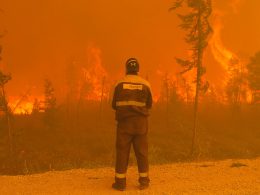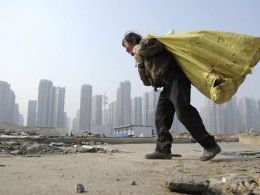After this year’s World Economic Forum in Davos, with 2,500 politicians and capitalists from around the world, the media reported an, “increasing optimism about the world economy”. But this in no way means the crisis is over.
The main reason for the optimism is a strong rise on many stock markets and larger dividends for shareholders. The world’s 100 richest people increased their wealth by $241 billion, to $1,900 billion in 2012.
Behind this lies the massive efforts of the central banks – the U.S. Federal Reserve and the ECB, the EU’s central bank – which have been buying up securities worth hundreds of billions of euros and dollars. This money, mostly paid to the banks, almost automatically leads to a rise in stock markets. However, this is not the same as an economic upturn. Rather, it shows that the factors that initiated the crisis of 2008-09 still dominate.
In an article explaining the optimism, the Economist concludes that the most important reason is that the world has managed to avoid the worst potential disasters. So far, the euro has not collapsed and the US did not fall over the fiscal cliff.
However, the facts speak against optimism. Last month, both the World Bank and the International Monetary Fund (IMF) downgraded their predictions for the world economy. The World Bank has reduced its estimate of global economic growth for 2013 from 3% to 2.4.%. For the euro zone, the reduction is from 1.1% growth to minus 0.1%. The IMF predicts negative growth of 0.2% for the euro area, with many others being more pessimistic.
Among the worst hit crisis countries in Europe – Spain, Italy and Portugal – are in official recession (a shrinking economy for at least six months), while Greece is in a depression. The Greek economy has shrunk 25% since 2008. While speculators rejoice, unemployment continues to rise. Nearly 26 million people are without jobs in the EU, of which 18.7 million are in eurozone countries.
Four of the six biggest high-income countries have still not recovered since the crisis began – France, Britain, Italy and Canada. Of the other two, Germany – Europe’s biggest economy – shrank by 0.5% in the fourth quarter of 2012.
Also, the US economy – seemingly the strongest recovering major economy – shrank from October to December by 0.1%. The ‘fiscal cliff’ was avoided at the last minute on New Year’s Day, but will return in March, with new threats of large automatic cuts. Unemployment in the US is already approaching 8%.
The news of a “turnaround” in China must be seen in this context. The new leaders at the top of the dictatorship in Beijing have continued on the same path as before – big investments financed by loans. That means short-term growth while inflating the financial bubble yet further and increasing over-capacity.
Disagreement
“2013 will be a crucial year”, said IMF Managing Director, Christine Lagarde, at the World Economic Forum. It was also obvious that the world’s leaders disagreed on what to do and who should pay the costs. Instead of a common strategy, their policies are increasingly about trying to send the bill abroad.
The contradictions are being sharpened. All industrialised countries are committed to increasing exports at a time when world trade grew by only 4% in 2012. The main result of the Federal Reserve’s Quantitative Easing – now at over $3,000 billion, 20% of its GDP – is that the dollar’s value is falling, which favours US exports. A similar effort is now being undertaken by the new Japanese government. This means that the euro is increasing in value, leading the French government to demand counter-measures by the ECB.
The state of the world economy was summed up by one commentator in a recent article about Spain underlining, “The sharp contrast between brightening market sentiment and the worsening situation on the ground”. Bankruptcies, unemployment and the decline in GDPs are all worsening.
The crisis has entered a new phase, and the capitalist system’s failure is as clear as ever. The wealth of the parasites in the stock market is growing in parallel with unemployment and social distress. The working class needs parties that stand for a clear socialist alternative.












